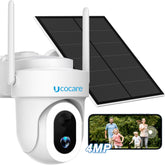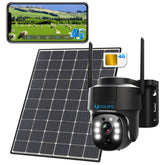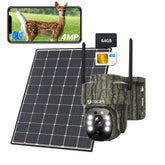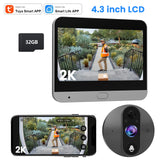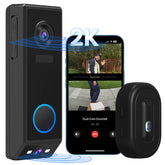How do you know your home security cameras are blocked?
How do you know your home security cameras are blocked?
Leaving home for work with no one inside, having a surveillance system to check for potential thieves or monitor the status of pets has become a common choice for many people. This allows them to address issues promptly and ensure security. However, on the flip side, concerns about the intrusion of home camera footage by hackers or unauthorized surveillance often linger.
Today, we will explore methods to shield surveillance cameras, helping you prevent illegal monitoring and safeguard your privacy.
What Can Block Surveillance Cameras?
Modern security cameras are typically connected to the internet, either through wireless networks, cellular data, or wired connections. Some cameras store footage internally and transmit it when online connectivity is available. Therefore, strategies to block surveillance cameras generally involve disrupting the network or damaging the cameras.

How can security cameras be hacked?
1.Weak Passwords:
Users often employ default or simple passwords, making it easy for hackers to exploit vulnerabilities through brute force or dictionary attacks.
2.Exploiting Vulnerabilities:
Hackers take advantage of system vulnerabilities, employing specific attack methods to infiltrate cameras. Buffer overflow vulnerabilities, for example, might be exploited to crash the camera's program and gain system privileges.
3.Phishing Attacks:
Hackers use phishing websites, emails, or other means to entice users into downloading malicious software, subsequently gaining control over the cameras.
4.Man-in-the-Middle Attacks:
Hackers intercept communication between cameras and users, manipulating data or stealing information. For instance, setting up a rogue hotspot on a public Wi-Fi network to trick users into connecting and intercepting data between the camera and user.
How to tell if a security camera has been hacked?
1.Observe Camera Behavior:
Anomalies like unexpected movements, rotations, or unusual sounds from the camera during off-hours may indicate a compromise.
2.Unusual Network Traffic:
A sudden increase in home network traffic could suggest that a camera is under the control of hackers, either for remote surveillance or participation in a DDoS attack.
3.Anomalous Behavior of Devices:
Unusual behavior, such as automatic downloads of unknown software or the appearance of abnormal ads on devices like computers or phones, may signal a compromise affecting the camera.
4.Unauthorized Logins:
The presence of unauthorized login records on the camera could indicate a potential security breach.
Real-Life Cases
In the United States, a family of four discovered their home cameras had been hacked. The hacker, utilizing brute force methods, guessed the camera's password and gained unauthorized access. Subsequently, the hacker monitored the family's activities, collecting private information. During the intrusion, the hacker also played eerie sounds through the camera's speaker at night, causing extreme discomfort. Upon realizing the issue, the family checked the camera's login records, uncovering unauthorized login attempts. They promptly reported the incident, leading to a technical investigation. The family learned the importance of setting complex passwords and regularly updating firmware to prevent similar events.

In another case in Australia, a couple had installed a camera in their baby's room for monitoring purposes. One day, they noticed the camera moving automatically and emitting strange sounds when no one was operating it. Suspecting an intrusion, the couple immediately disconnected the camera. Investigation revealed that a hacker had used phishing techniques to trick them into installing malicious software. The hacker exploited this software to infiltrate and control the camera. To prevent future incidents, the couple educated themselves on identifying phishing emails and installed a firewall on their home network.

Preventive Measures
1.Set Complex Passwords:
Use complex passwords for cameras and change them regularly.
2.Update Firmware:
Keep camera firmware up-to-date to patch known vulnerabilities.
3.Install Firewalls and Antivirus Software:
Employ firewalls for home networks and install antivirus software on computers and phones to enhance overall security.
4.Choose Reliable Brands:
Opt for cameras from reputable brands to ensure product quality and security. Well-known security camera brands include eufy, Wyze, Nest, Blink, Arlo, and our UCOCARE brand.
5.Implement Two-Factor Authentication (2FA):
Enable 2FA for cameras, requiring an additional verification step (e.g., a temporary code via SMS or authenticator app) even if a hacker successfully cracks the password.
6.Limit Remote Access:
Only enable remote access when necessary and disable it when not in use to minimize the exposure of cameras on public networks.
The provided real-life cases serve as reminders that security concerns with home cameras should not be underestimated. To ensure camera security, preventive measures such as setting complex passwords, regularly updating firmware, installing firewalls and antivirus software, and raising awareness of network security are essential. By staying vigilant against various cyber threats, you can effectively protect your home cameras from intrusion.

